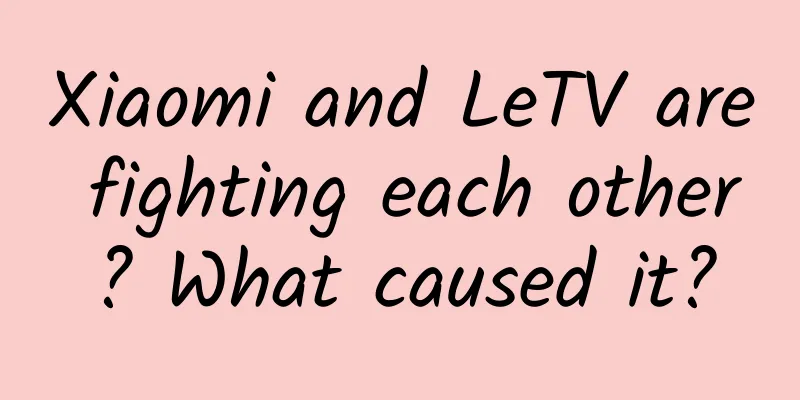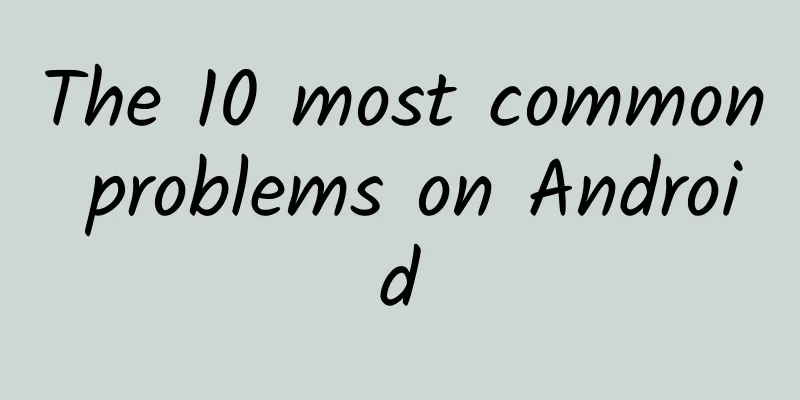Xiaomi and LeTV are fighting each other? What caused it?

|
Editor’s Note: The Internet community has been in turmoil recently. Just two days ago, 360 and Baidu staged a year-end quarrel. Now it's Xiaomi and LeTV. I remember that the Chinese are a very reserved people. They never curse people to their faces. They usually smile but hide a knife. Where is the Chinese reservedness? The Internet community is so small. Aren't they afraid of embarrassment? Or is it intentional? I'll make a comment.
The day before yesterday, "China Entrepreneur" interviewed Xiaomi co-founder and vice president Wang Chuan, and published an article that was quite shocking from the title to the content, causing quite a stir: Lei Jun's younger brother Wang Chuan fired back: LeTV is doomed! In the article, Wang Chuan denounced LeTV for doing everything in the field of Internet TV, "playing the game of horse racing" with competitors in different industry chains, and "not cooperating in the industry". Such denunciations are really a bit confusing, after all, Xiaomi and LeTV are still partners. At the Xiaomi Note launch conference a few days ago, Lei Jun just solemnly promised to "make more friends and fewer enemies". With Wang Chuan's words, does it mean that he is not going to cooperate with LeTV? In Xiaomi's view, film and television content producers, video websites and TV terminals are the three most important aspects of the Internet TV business. Xiaomi's thinking in making TVs is more "open", and it can use the money raised from high valuations to make large investments. Xiaomi has invested in content production, content distribution and broadcasting, and the only self-operated businesses in the entire chain are TVs and box terminals. Therefore, Wang Chuan probably wants to express this point: Xiaomi’s “openness” is much better than LeTV’s “closedness”. LeEco's response made many viewers laugh. In the acrostic poem at the end of the response, LeEco directly pointed out that Wang Chuan, as the head of Xiaomi's TV business, learned vertical integration from LeEco, but ended up learning something that was neither fish nor fowl, and ultimately "brought shame upon himself." The little scholar stole the Mido TV from Yuefu, but he couldn't use it. The master asked him why. The rivers and streams are all nameless. He knew that he had great ambitions but little talent. He learned from the master the vertical integration theory. In fact, he didn't know it, but he pretended to know it. He humiliated Leimen and became a laughing stock. LeTV also said, "If we can't join hands, we can at least forget each other," and it seems that it is ready to break up - this is once again a hint that LeTV is ready to cut off the content provided to Xiaomi. Let's put aside the grudges between big companies and return to the discussion of the Internet TV business. What is the "vertical integration" that LeTV is so proud of? In fact, it is very simple: from the production of video content to its distribution, to its presentation to users, whether through computer web video websites or Internet TV, LeTV is deeply involved in every link. Unlike Xiaomi, which spends money to let others do it, LeTV is doing it itself. People need film and television content, so LeTV has LeTV Pictures. Since its establishment in 2012, LeTV Pictures has participated in the production and distribution of 30 films, including many Hollywood blockbusters and heavyweight domestic films, such as "The Expendables" Part 2 and Part 3, "Coming Home", "Tiny Times", etc. LeTV is a "content giant" in the Internet industry. LeTV has the copyright of more than 100,000 episodes of TV series and more than 5,000 movies in terms of content, and has a relatively close cooperative relationship with the six major film distributors in the United States. LeTV Pictures is just one aspect of LeTV's content. With film and television content, there needs to be a playback terminal, so LeTV also has its own video website and mobile phone applications. Due to the abundance of its own content, LeTV.com and mobile phone video playback applications are quite popular. In terms of home video content playback terminals, LeTV has also launched a number of products such as set-top boxes, LeTV boxes and LeTV TV, ensuring that it has a sufficiently competitive playback platform and environment in the user's living room. It can be seen that the difference between LeEco and Xiaomi in their layout methods in the Internet TV industry is already very obvious. The former used to adopt the method of self-operated content production, broadcast control, broadcast platform and terminal, controlling the important links of the industrial chain under its own umbrella, which is a relatively "heavy" existence; while the latter injected a large amount of capital into the industrial chain and went into battle "lightly". You will find such an interesting phenomenon: Xiaomi TV's enemy is exactly the same as Xiaomi mobile phone's enemy - LeTV, which is actually the Samsung in the Internet TV industry. The way LeTV plans and operates its core video business is exactly the same as the "Samsung model". In this way, the logic of why Xiaomi wants to compete with LeTV becomes very clear. In fact, the competition between LeTV and Xiaomi, and between Samsung and Xiaomi, is not between two companies, but two models. Samsung's terminal products are smartphones, but the manufacturing technology and supply chain integration capabilities of Samsung Electronics as a whole play an important role in the production process. Samsung itself has covered all the important components required for mobile phones, such as processors, communication modules, display panels, flash memory, etc., providing strong support for the mobile terminal department. Let's look at LeTV? The main demand of users for purchasing Internet TV is to enjoy content, and the content production, distribution business and playback services under LeTV Holdings are all to serve this demand of users. LeTV's own content production, distribution and playback capabilities are actually the "processors", "flash memory" and "display panels" at the content level of LeTV TV, providing strong support for LeTV TV. Obviously, LeEco believes that Xiaomi TV is copying LeEco's vertical integration model, and the copy is not very good, which made Wang Chuan angry. In LeEco's view, all of Xiaomi's industry layout is a copy of LeEco, for example, investing in video websites is a copy of LeEco's video website, and investing in 21Vianet and Kingsoft is a copy of LeEco's LeEco Cloud. But in fact, Xiaomi is not a fan of the self-operated industrial chain and vertical integration business model. LeEco has completely misunderstood the situation. Xiaomi has grown rapidly to a valuation of 45 billion US dollars in 5 years, and the "light" asset and heavy cooperation model has become the core strategy. In all of Xiaomi's major businesses, it is highly dependent on partners: almost all the components required for Xiaomi mobile phones are provided by partners, and only the operating system and design are developed by Xiaomi itself; Xiaomi has invested in dozens of ecological chain companies, constantly adding new members to Xiaomi's product portfolio; Xiaomi's TV products are even more so. It only makes its own TV and box hardware products, and is completely dependent on content and broadcast control partners in terms of content and playback. It has invested tens of billions of RMB in TV drama content giant Huace Film and Television, video websites and content platforms iQiyi, Youku Tudou and Xunlei, etc. In essence, Xiaomi does not participate in the operation of these content producers or video websites, but instead locks in its own TV terminals as a stable content output outlet through investment. However, Xiaomi's content strategy has become the main reason for LeEco to ridicule Xiaomi TV for not being popular - LeEco believes that although there is a lot of content on Xiaomi TV and box platforms, most of it does not "belong" to Xiaomi, and is not as popular with consumers as LeEco TV, which has abundant self-owned content. Previously, Xiaomi lacked its own copyrighted content, and the license partner of Internet TV was warned by the State Administration of Radio, Film and Television to rectify, and its strategy of dominating the living room was hindered. In addition, due to the difficulty of engineering and limited sales, the sales of the first generation of Xiaomi TV were not ideal. However, the Xiaomi TV 2 released in June 2014 improved and began to pose a real threat to LeTV Super TV, which is why LeTV responded so fiercely to Xiaomi. Moreover: Xiaomi, which has just completed financing and is now thriving, is much more stable than LeTV, an A-share monster whose price may rise or fall to the daily limit or be suspended due to policy reasons at the slightest news. Samsung's crisis has already arrived. PingWest has explained this phenomenon many times. The overly heavy vertical integration model is the culprit. Samsung is weak in software, and its supply chain advantages cannot be transferred to software and Internet ecology. When facing competitors like Xiaomi, which has a stronger Internet ecology and the same product quality, it is extremely vulnerable. As a result, Samsung's mobile phone sales began to decline, and the decline in sales will have a reverse impact on the supply chain behind it, further exacerbating Samsung's crisis. LeEco and Samsung are in different situations, but the logic is similar. In the future, they may also be held back by the heavy vertical integration model. In the past, LeEco had strong capabilities in all links of the IPTV chain, which made it ahead of other domestic Internet video companies. However, as LeEco was listed on the A-share Growth Enterprise Market, the political and regulatory risks became increasingly greater, and the company's stock price was frequently affected by good or bad news, which seemed extremely unstable. You can often see LeEco's daily limit down, or Jia Yueting's occasional appearance triggering a daily limit up. In addition, LeEco has experienced four policy-based suspensions since July last year. In LeEco's past financial reports, there are doubts about revenues such as content production, copyright purchases, and video advertising revenues, which means that LeEco's proud vertical integration model also hides crises. For more information about LeEco's business and capital operations, you can also read the article "Why is LeEco always suspended?" LeTV also used the term "open closed loop" to respond to Wang Chuan's "closed" theory. Let's not discuss what "open closed loop" actually means - even if LeTV is open, it does not mean that partners really dare to cooperate with LeTV in a sufficiently deep manner. Judging from past business practices, the benefits of being able to sit under a big tree and enjoy the shade have become a bonus for LeTV, allowing it to occupy an important position in the domestic content production, distribution and broadcasting fields, while also being able to represent a considerable portion of foreign imported film and television resources. As the situation changes, it is hard to say whether LeTV's umbrella can withstand the wind and rain in the future. It is most appropriate to describe LeEco as "a single move affects the whole body". This company seems to always be expanding new businesses, and it seems that only new businesses can boost the industry's confidence in LeEco. In addition to laying out various links in the Internet TV business, LeEco's recent car-making plan has also become the focus of attention. Together with Jia Yueting's occasional appearances and statements, it constitutes the only hope for LeEco's stock price to rise. By the way, LeEco also plans to release a mobile phone operating system next week to enter the smartphone industry. We dare not make a conclusion whether LeTV's model will "die sooner or later" as Xiaomi's Wang Chuan said. It is possible that there is an incredible super power to hold LeTV back. However, Xiaomi TV has inherited Xiaomi's model of light assets and heavy cooperation, which has brought competitive pressure to LeTV. If there is no grudge, what is LeTV and Xiaomi fighting about? |
<<: A First Look at Apple WatchKit
Recommend
What does "starting with an egg" mean? This is called native advertising!
When doing information flow advertising , the mos...
Analysis of Himalaya user operation strategy!
Himalaya has carved out a niche in the audio and ...
Will bubble gum stick to your intestines? Will watermelon seeds grow small watermelons in your stomach? Did you believe these words when you were a child?
This article is produced by "Science Facts&q...
Android system has the largest market share, WP is still the third
Kantar Worldpanel ComTech released its quarterly ...
When the weather gets cold, you can eat fruits hot →
As the weather gets colder, friends who want a ba...
A must-read for flu season! The latest flu vaccination guide for 2022 is here
Recently, the Chinese Center for Disease Control ...
Korean automakers offer huge subsidies in the U.S. to maintain sales, but remain indifferent to the decline in the Chinese market
Korean automakers really need to think carefully ...
Audi CEO Stadler is under investigation for second time due to exhaust fumes
Foreign media recently disclosed that two people ...
How much does a bull whip cost? How much does bull whip cost per pound in the market?
Many people should know the special effects of bu...
The latest research found that comets from outside the solar system originally ran away from the solar system!
Comets from outside the solar system, some of the...
Luke Media’s 4th live streaming offline practical course
Introduction to the resources of Luke Media's...
The most powerful Wenshengtu model! How amazing is the visual beauty of Stable Diffusion 3?
Last month, Stability AI released its third-gener...
Google now releases the second beta version of the Android 14 system developer preview
On March 9, Google released the first developer p...
What is User Growth Marketing? How to do it?
Have you noticed that there are more and more ope...
Food prices rose 21.9% in February! Why are food prices rising? The National Bureau of Statistics explains the reason!
February is a critical period for epidemic preven...









